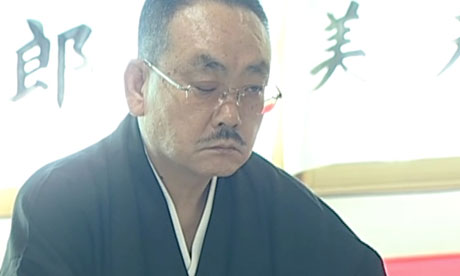Yakuza chief arrested in Japan
Fears of violent power struggle in crime syndicate after Yamaguchi-gumi's second-in-command, Kiyoshi Takayama, is detained in Kobe

The arrest today of the de facto leader of Japan's most powerful underworld organisation has sparked fears of a violent internal power struggle, as police step up their crackdown on organised crime.
Kiyoshi Takayama, the second-in-command of the Yamaguchi-gumi, is being held on suspicion of extorting about ¥40m (£300,000) from a man involved in the construction industry.
The national police agency declared war on the Yamaguchi-gumi in September in an attempt to rein it in before the release of its leader,Kenichi Shinoda, from prison next spring.
Shinoda began a six-year prison sentence in December 2005 for violating gun control laws and entrusted the running of the Yamaguchi-gumi to Takayama, who is also head of the organisation's biggest and most violent faction, the Kodo-kai.
"If Takayama is successfully prosecuted it will be devastating for the Yamaguchi-gumi, and could even spark a war for control of the organisation," said Jake Adelstein, author of Tokyo Vice: an American Reporter on the Police Beat in Japan.
"He has been running the organisation with an iron fist, and other factions will see his arrest as an opportunity. His antagonism towards the police has angered some in the organisation. He is not a popular man."
Takayama, 63, did not resist arrest during a dawn police raid involving 140 officers at a Kodo-kai base in the western city of Kobe. He has, however, denied involvement in the extortion case, according to Japanese media.
Although he was not present at meetings with the alleged extortion victim, police believe they can build a case against him using a law that holds gang leaders responsible for crimes committed by their juniors.
When Shinoda was sworn in as the Yamaguchi-gumi's sixth don in July 2005, he vowed to expand the 95-year-old organisation's influence beyond its traditional Kobe base.
Until recently Japan's crime syndicates, which are not illegal, operated with relative impunity. Gangsters made no attempt to hide their underworld affiliations and listed their offices in the phone book.
But Takayama's arrest has heightened fears of a dramatic deterioration in relations with the police.
Takaharu Ando, the combative head of the national police agency, has vowed to destroy the Yamaguchi-gumi as part of an unprecedented crackdown on organised crime. "We want them to disappear from public life," he told reporters after his appointment last year.
Aside from gambling, loan sharking, protection rackets and prostitution, the yakuza have added stock market manipulation and front companiesto their myriad illegal activities.
Takayama was influential in the Yamaguchi-gumi's expansion into Tokyo,an audacious move that led to several shootings in the capital in 2007.
The Kodo-kai faction, thought to have about 4,000 members, has dispensed with the yakuza's traditional policy of co-operating with the police. Its members have followed officers to their homes, photographed them with members of their families, and attempted to unearth information that could be used to blackmail them.
In other major departures from yakuza tradition, they never confess to their crimes and have been accused of targeting civilians.
There were about 87,000 gangsters active in Japan at the end of 2005, according to the national police agency. An estimated 50,000 belong to the Yamaguchi-gumi, which has recently attracted mobsters from smaller gangs targeted by rigorous police investigations.

No comments:
Post a Comment